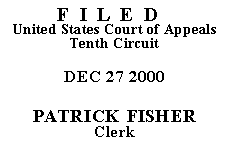

| JIMMY G. NIXON, SR.,
Plaintiff-Appellant, and KEITH HONAKER, Plaintiff, v. JOSEPH BROOKS, Warden; JANET RENO, Attorney General of the United States; KATHLEEN HAWK-SAWYER, Director Federal Bureau of Prisons; WILLIAM E. CAMPBELL, President, Phillip Morris Co.; EDWARD A. HORRINGTON, Jr., Chairman, Ligget Group, Inc.; JAMES W. JOHNSON, Chairman, R.J. Reynolds Tobacco Company; DONALD S. JOHNSON, President, American Tobacco Company; STEPHEN RAFFLE, Tobacco Institute; TILFORD F. RIEHL, Vice President, Brown and Williamson Tobacco Corporation; THOMAS E. SANDEFUR, Jr., Brown and Williamson Tobacco Corporation; ANDY SCHINDLER, Head of Manufacturing, R.J. Reynolds Tobacco Company; ALEXANDER W. SPEARS, III, Vice Chairman, Lorillard Tobacco Company; JOSEPH TADDEAO, President U.S. Tobacco Co.; ANDREW H. TISCH, Chairman, Lorillard Tobacco Company; CHARLES O. WHITLEY, Senior Consultant, Tobacco Institute; FEDERAL DRUGS AND ADMINISTRATION, Does 1 to 1000, Defendants - Appellees. |
No. 00-1069 (D.C. No. 99-Z-2039) (Colorado) |
Mr. Nixon was granted leave to proceed in forma pauperis and directed to either pay the partial fee or show why he could not do so within thirty days. When he missed this deadline his action was dismissed. Three weeks later, he filed a motion for reconsideration contending he had not received the court's in forma pauperis order and providing material allegedly establishing his inability to make partial payment. The district court construed the motion as one for relief from the judgment under Fed. R. Civ. P. 60(b), and denied it.
The Federal Rules of Civil Procedure do not recognize a motion to reconsider and we construe such a motion in one of two ways. See Hawkins v. Evans, 64 F.3d 543, 546 (10th Cir. 1995). If the motion is filed within ten days of the district court's entry of judgment, it is treated as a Rule 59(e) motion to alter or amend the judgment. Id. When, as here, it is filed more than ten days after entry of judgment, it is treated as a Rule 60(b) motion. Id. An appeal from the denial of a Rule 60(b) motion does not itself preserve for appellate review the merits of the underlying judgment, and raises for review only the district court's denial of the motion to reconsider. Id. Relief under Rule 60(b) is discretionary and is warranted only upon a showing of exceptional circumstances. Cashner v. Freedom Stores, Inc., 98 F.3d 572, 576 (10th Cir. 1996).
In denying reconsideration, the district court pointed out that the order granting leave to proceed in forma pauperis, like the order of dismissal, was mailed to Mr. Nixon at the address he provided. The court determined that the circumstances did not meet the standard for Rule 60(b) relief and we are not persuaded the court abused its discretion in so doing.
The judgment of the district court is AFFIRMED.
ENTERED FOR THE COURT
Stephanie K. Seymour
Chief Judge
*.After examining appellant's brief and the appellate record, this panel has determined unanimously that oral argument would not materially assist the determination of this appeal. See Fed. R. App. P. 34(a)(2) and 10th Cir. R. 34.1(G). The case is therefore submitted without oral argument. This order and judgment is not binding precedent, except under the doctrines of law of the case, res judicata, or collateral estoppel. The court generally disfavors the citation of orders and judgments; nevertheless, an order and judgment may be cited under the terms and conditions of 10th Cir. R. 36.3.